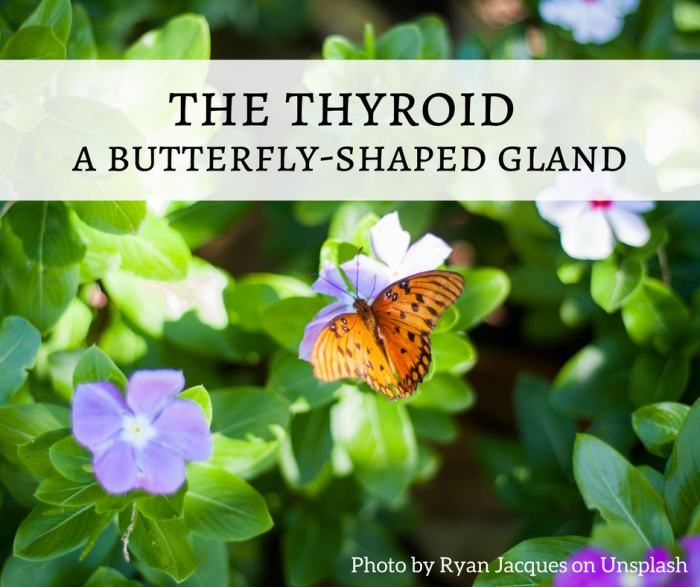THYROID ISSUES – A PAIN IN THE NECK

Happy Friday!
The thyroid is a small butterfly-shaped gland located in the front of the neck that produces hormones that influence all of our cells and organs and helps the body to use energy properly. If your gut is out of whack, so is your thyroid. A proper diet and balanced lifestyle are essential ingredients for a healthy gut, healthy thyroid and healthy life.
Do you suffer from thyroid issues or think you may have a problem with your thyroid? If so, read on and trust your gut to lead you onto the right path to health.
hyperthyroidism vs hypothyroidism
If the body produces too much of the thyroid hormone, the metabolism speeds up and the condition is called hyperthyroidism and often associated with Grave’s Disease; too little, the metabolism slows down and the condition is referred to as hypothyroidism and often linked to Hashimoto’s Disease. Some hyperthyroid symptoms include unexplained weight loss, feeling anxious and shaky, feeling more hot than usual and hair thinning or hair loss. Some hypothyroid conditions include feeling tired, unexplained weight gain, sensitivity to cold, brittle nails and hair loss. Both thyroid conditions are considered auto-immune diseases. For these conditions, gut health is of the utmost importance. Check out 19 Signs Your Thyroid Isn’t Working Right from health.com if you think your thyroid is out of sync but have yet to be diagnosed.
is a plant-based diet possible for people with thyroid issues
A friend recently asked me if a vegetarian diet is healthy for people with hypothyroidism, a condition she has. Her nutritionist had suggested she consume meat and meat products a couple of times a day to increase her energy levels but she prefers to be a vegetarian. I was intrigued by this. Why would meat be a food recommended to boost energy levels? We have all heard of carb-loading before running a marathon, but meat-loading? Hmmmmm…..
meat for thyroid issues? – glutamine
Meat contains glutamine, an amino acid essential for gut health and therefore, helpful for the thyroid. However, there are other non-animal sources for glutamine. In addition to beef, poultry, eggs and pork, glutamine is also found in corn, dried lentils, barley, peas, beans and peanuts to name a few foods. Need some inspiration to incorporate more of these foods into your life? Try these recipes – black bean dip; lentils; and the ultimate tuna-ish sandwich.
Soy as a source of glutamine
cruciferous vegetables as sources for glutamine
Cabbage is a food containing high amounts of glutamine. There is some controversy about cabbage as it is a goitrous vegetable like broccoli which can interfere with thyroid hormone synthesis. However, the goitrogens are inactivated if cooked, even lightly steamed. Click here for article by Dr. Andrew Weil, “Is broccoli bad for the thyroid”? I also consulted Dr. Joel Fuhrman’s site. He agrees that cruciferous (goitrous) vegetables, when cooked or fermented (as in sauerkraut), are not harmful for those with thyroid issues. If you are not familiar with Dr. Fuhrman, he believes in a Nutritarian diet consisting of high-nutrient GBOMBS (greens, beans, onions, mushrooms, berries, and seeds) to improve gut health, which in turn, improves autoimmune conditions. I find this to be true for nearly every ailment from cardiovascular disease to cancer. As Hippocrates said, “All disease begins in the gut.”
RECOMMENDED FOODS/VITAMINS FOR THYROID CONDITIONS
Good fats – coconut oil (PS I only cook at high heat with coconut oil and recommend that to my clients). See Dr. Mercola’s article, “How to help your thyroid with virgin coconut oil.” Other foods containing good fats include raw coconut meat, cashews, almonds, seeds, walnuts, pecans, avocados, dark chocolate and raw cacao. It is best to avoid animals products high in cholesterol for your fat source as these foods are linked to other health issues like heart disease.
A well-varied diet is important to take care of your thyroid long term. Rotate your greens. As mentioned above, you do not have to give up healthful plant-based food such as soy and goiterous vegetables like broccoli and cabbage, you just need to be aware of the sources, method of cooking and potential interactions with medications.
If you choose to make some dietary changes to improve your thyroid, keep a food journal. If you need help determining which foods are causing a sensitively issue, you can contact me to discuss an elimination diet.
FOODS TO AVOID
keeping the gut healthy
- minimize your use of antibiotics
- get dirty – we are obsessed with over-sanitation; spend time walking barefoot on the earth and consider gardening to get your hands dirty
- consider taking a probiotic and/or eating fermented foods to get more of the ‘good’ bugs in you
- limit your stress level
- get adequate sleep
RELAXATION & HERBS
EXERCISE
I would love to hear from you
sources
CLICK HERE TO RECEIVE BELAVIE WEEKLY POSTS WITH HEALTH TIPS, BEAUTY TIPS AND RECIPES DIRECT TO YOUR INBOX PLUS A FREE GIFT.
READY TO TAKE YOUR HEALTH AND WELLNESS TO ANOTHER LEVEL THROUGH STRUCTURED HEALTH COACHING? CLICK HERE FOR A FREE 30-MINUTE CONSULTATION AND REVIEW OF YOUR HEALTH HISTORY.
CHECK OUT MY SHOP PAGE TO PURCHASE BELAVIE ORGANIC SKINCARE PRODUCTS.
CLICK THE BELOW BUTTONS TO SHARE THIS POST ON YOUR SOCIAL MEDIA OR EMAIL TO A FRIEND.


Great Blog, I’ve had thyroid problems practically all my life. My Doctors have always said to eat plenty of meat for the condition. But I find that when I stray away from meats and stick to Vegan diets I feel much better. When I feel exhausted I simply take Turmeric in a capsule or add to a drink. I also eat red fruits and keep as active as possible. When I do feel exhausted and overwhelmed I have learned not to feel guilty or bad about taking a break. Thanks again for this blog.
Thanks so much for your comment Maria. Good to know about Turmeric as it also helps with the inflammation caused by thyroid issues. I love and appreciate you and your positive attitude. Thanks for sharing.
so resourceful!! Thank you so much.
I also believe in a clean, organic, non processed plant based diet. It is a powerhouse for good health and it safeguards the environment, including the animals that are heavily exploited in the meat and dairy industry.
And yes:. “As Hippocrates said, “All disease begins in the gut.” I have noticed a major change in my wellbeing by substituting wine and all other types of heavy alcohol like whiskey for Kombucha, which by the way, it looks gorgeous and tastes delicious in a frozen glass. I feel so good! That and some sauerkraut in sandwiches and a probiotic supplement in the mornings.
Love and trust your guts:)
love it. Love and trust your guts. So true!